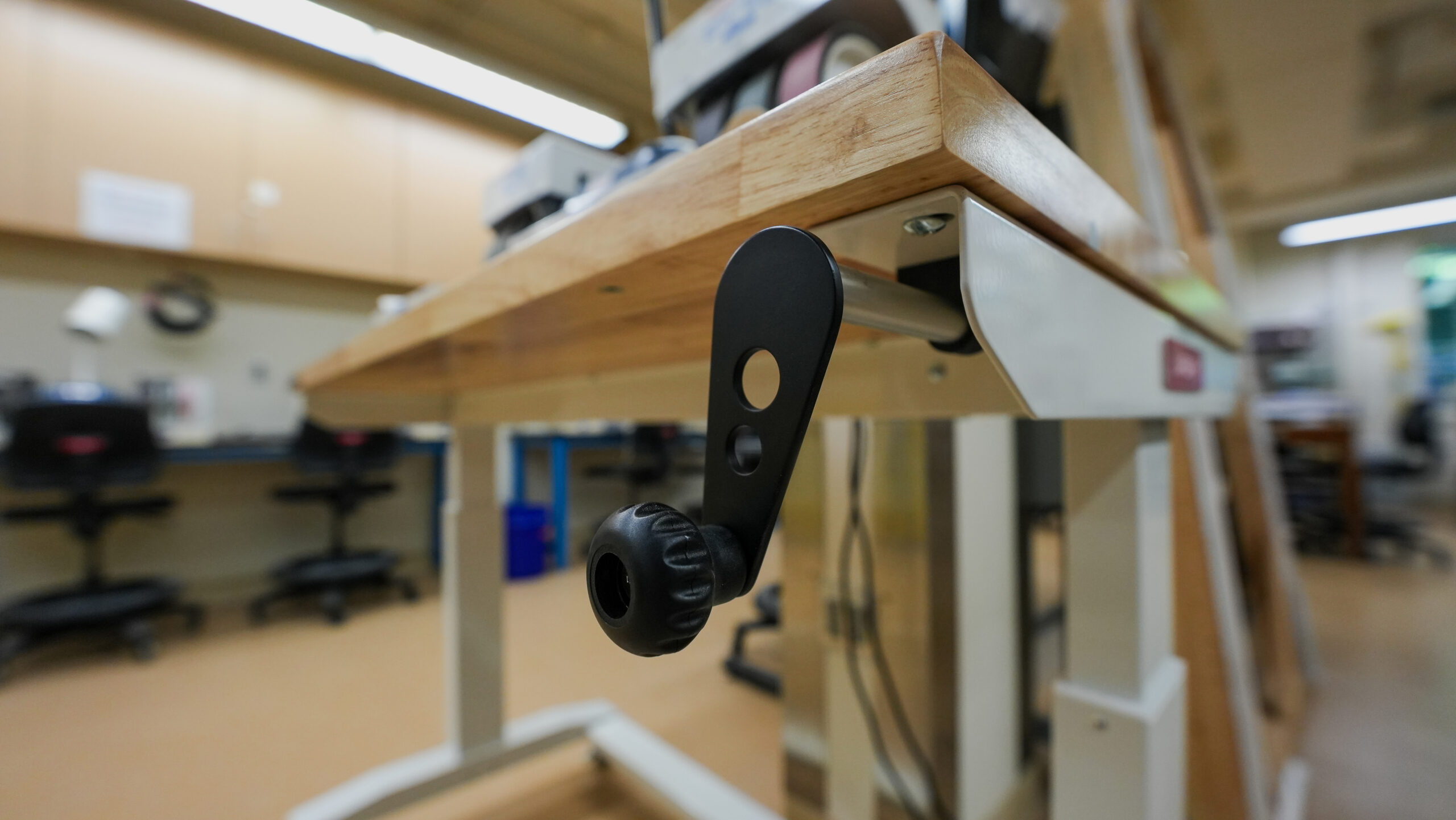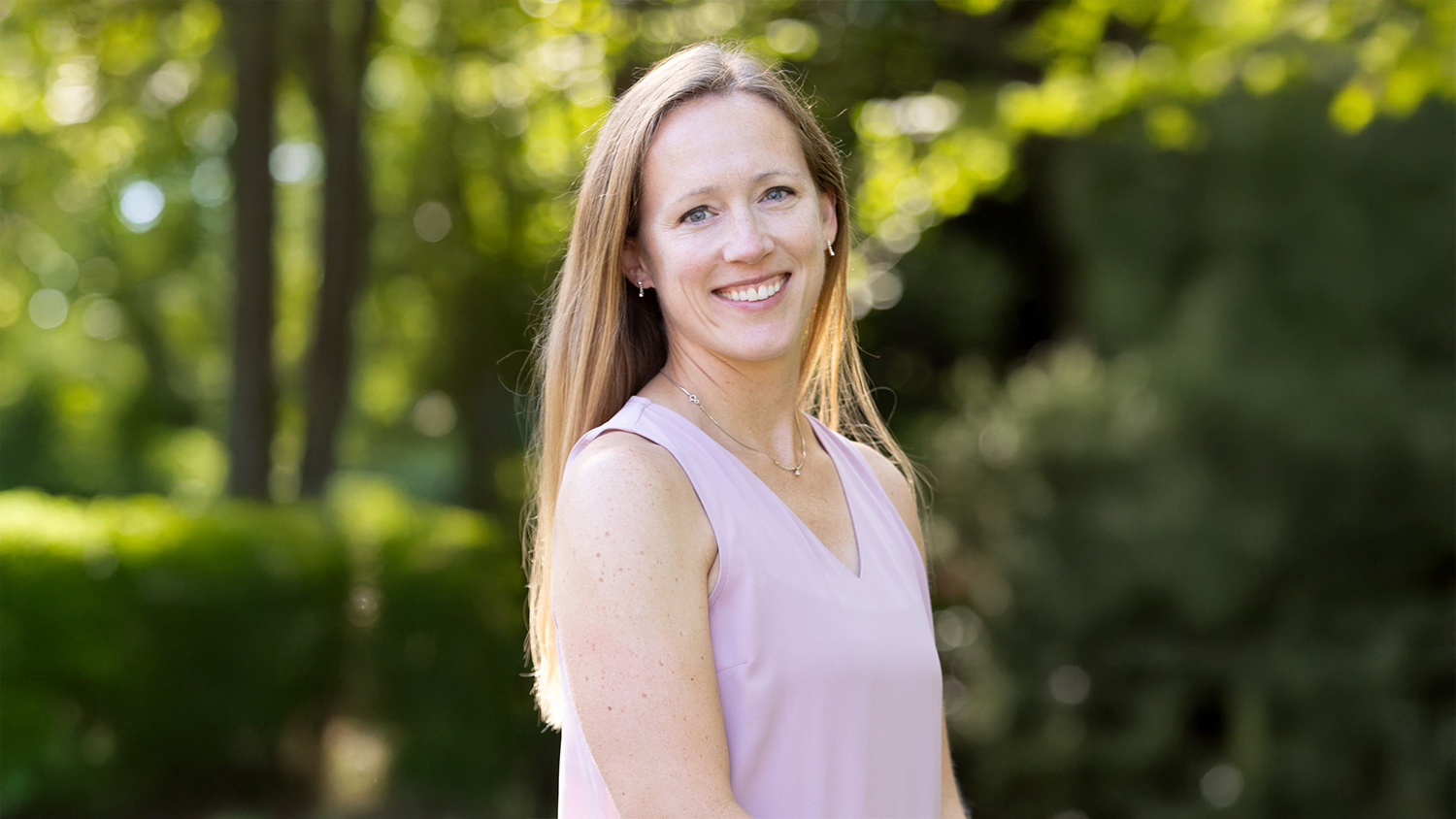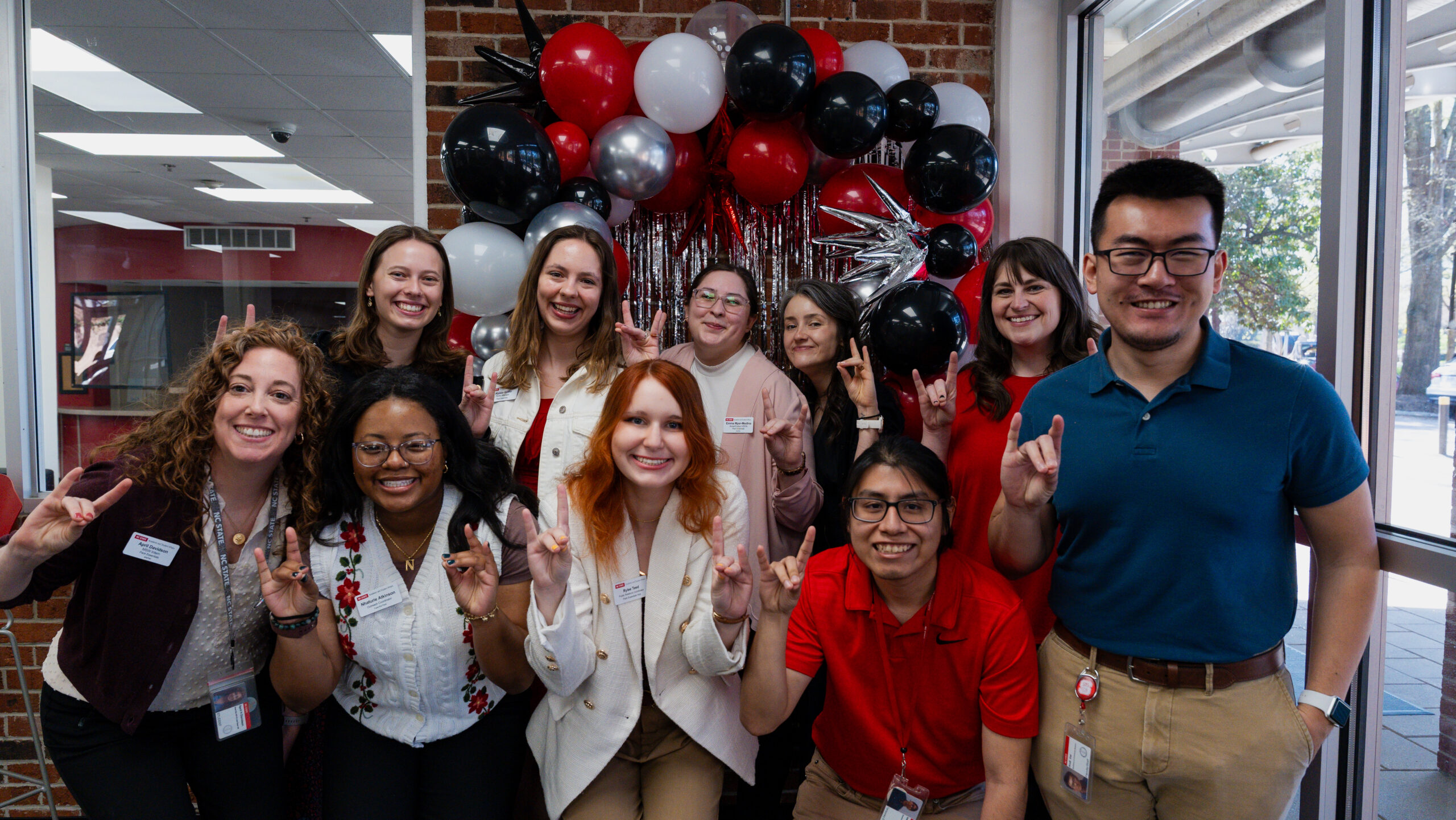The Home of Student Success
By: Susan Poulos
NC State University’s innovative and long-standing approach to whole student success is built into the entire college experience. In recent years, this commitment is even stronger than ever.
The NC State experience is intentionally designed to be an expansive, transformative one in which exposure to new people, places, and ideas encourages all students to explore their interests and passions as they chart an academic and life path. Achieving academic, personal, and professional fulfillment and success are the University’s goals for every student.
To that end, the Division of Academic and Student Affairs (DASA), formed in 2012, is home to the majority of student and academic support programming on campus — and to student success. DASA touches every student on campus, through its departments, programs, initiatives and student groups. It is the center of high impact, innovative, inclusive, out-of-classroom opportunities that enrich the NC State experience for every student, and includes the University College, Arts NC State, and Student Development, Health, and Wellness.
Student success engaged early
Many NC State students begin their college success experience even before they arrive as freshmen. With numerous programs reaching out to high school and transfer students to inform them about DASA’s offerings prior to classes starting, newly arriving students start off their NC State adventure with an edge.
For example, University Housing’s Open Housing informs new students about a rich variety of on-campus residential experiences, including the 14 Living and Learning Villages, which are intentional residential communities reserved for students who share interests, values, and priorities.
New Student Programs (NSP) focuses on first-year student orientation that provides new students an overview of all the ways to become involved while on campus, both inside and outside of the classroom. With customized programs for incoming freshmen, transfer, and international students, the NSP encourages students to become familiar with, and take engaged with DASA and greater university’s vast offerings.
One of the most prominent Living & Learning Villages is the Exploratory Studies Village, which serves students enrolled in the Exploratory Studies program. Students participating in this program are immersed in a unique and deeply enriching community of fellow freshmen who are all interested in exploring their academic passions. Through creative programming, peer support, and staff and faculty engagement, the Exploratory Studies Village helps students create a solid foundation for a positive academic and social trajectory.
Peyton Holmquist, a senior in Communication studies, continues to benefit from her participation in the Exploratory Studies experience. “When I arrived at NC State I thought I knew what I wanted to study. I stumbled into the Exploratory Studies program and I’m so glad I did! This program gave me the space, guidance, and resources in my freshman year to figure out my passions, strengths, and interests. I learned about all of the amazing resources available through DASA, and was supported in exploring, engaging, choosing a major, and excelling. I wish we could have this centralized and intentional experience for every student.” Holmquist wanted to share the encouragement and care she received in her freshman year at the Exploratory Studies Living and Learning Village, so for her sophomore and junior years she became a mentor. “It was such a formative experience for me that I wanted to give back to incoming freshmen.”
Holmquist continued, “Freshmen are taking their first step into independence and finding their way. There’s no reason they have to ‘do it alone’. Throughout the undergraduate years there are many incredible student resources available here to help us navigate our college path, to establish connections with friends, faculty and professionals in our chosen fields, and to be successful. Our job as students is have an intrinsic desire and drive to succeed – motivation to become our personal best. These qualities, together with DASA’s student support network, virtually ensure success during and after college.”

Enriching programs help establish lifetime success
High impact experiences provided at NC State University lead to better-prepared students and graduates, higher retention rates, and higher grade point averages. They include:
- The University Tutorial Center (UTC) provides academic support for all undergraduates and graduate students in subjects such as chemistry, math, physics, writing and speaking. More than 3,000 students are served by the UTC each academic year, and more than 200 peer tutors are trained annually. Students are encouraged to the center early to preempt falling behind.
- The Office of Undergraduate Research (OUR) gives NC State University students real-life experience in discovery, inquiry and creativity through mentored research experiences with NC State faculty and other national and international scholars and professionals. By assisting students in identifying mentors and valuable research opportunities in their field, and having opportunities to share their research in a variety of venues, including research symposium, research journals, national conferences, and research exploration events, they gain relevant experience and forge important relationships.
Michaela Rikard graduated last year and is now at the University of Virginia pursuing her Ph.D. in Biomedical Engineering studying vascular biology and cardiovascular regenerative medicine. She participated in many of DASA’s high impact programs, and said her undergraduate research helped her take classroom concepts into the real world. She gained the practical skills of experimental design, forming a hypothesis and testing it, gathering and analyzing data, technical writing and presentation skills.
“My research experiences prepared me so wonderfully for graduate school interviews. I had all this excellent research experience that I could talk about during my interviews,” she said. Her advice to incoming freshmen (and other students) to engage with all that DASA offers, “Get involved! Check out an organization or program that you are interested in and then check out a couple things you may not know anything about. You will find new interests and passions in college that you never knew you had. Get outside of your comfort zone. Travel outside of the country. Get work experience. Be engaged in your community.”
- The Career Development Center (CDC) is offered to all NC State University degree students and recent graduates to facilitate career identity development, career planning, and job placement. Through workshops, symposiums, information sessions and presentations, the CDC guides students through career identity development, experiential learning opportunities, resume building, job search strategies and interviewing practice. The CDC cultivates and maintains relationships with employers for internship job creation and employment opportunities.
- The Center for Student Leadership Ethics and Public Service (CSLEPS) offers students distinctive learning opportunities that nurture leadership, service, responsible citizenship, and ethics. Among these are the Alternative Service Break (ASB), leadership development workshops and programs, and service initiatives that focus on local, national and global social justice concerns. CSLEPS helps students become ethical and effective leaders, activists, volunteers, philanthropists, engaged citizens, researchers, and social innovators.
The ASB program started in 1999 in response to Hurricane Mitch, which devastated parts of Central America. A group of students wanted to do something to help. Partnering with Habitat for Humanity, the group went to Honduras to rebuild homes. Over time, and with additional funding from outside sources, the program has grown to include 24 service break experiences and serving 340 student participants ranging from freshmen up through graduate students and even alumni.
Adam Culley, Assistant Director in the Center for Student Leadership, Ethics and Public Service (CSLEPS), said there are ASB participants who have never left North Carolina, or who have never been on an airplane. “These trips provide students with an incredible education on so many levels. We connect students’ passions with the trips, and help them discover how they can make an impact. In the midst of hunger, homelessness, poverty, and environmental issues, we show students how they can do small things wherever they are to make a positive difference.”
For example, when Vira Motashaw, DO, was a NC State pre-med student in 2008, she started the first ASB medical clinic in Mexico. She returned in 2015 to participate on a clinical trip to Ecuador. She said her experience in 2008 directly influenced her work in global health and has driven what she wants to do.
2015 was the first ever alumni ASB trip. Partnering with the Fuller Center for Housing, this group, which included new graduates and seasoned professionals, spent a week building homes in rural Nicaragua. As part of the trip they each made a $400 donation for travel awards to enable NC State students in need of financial assistance to participate in an ASB trip.
Kalene Hanson, a senior in Industrial and Systems Engineering, heard about the ASB programs on a visit to NC State as a high school senior. “What attracted me to NC State in the first place is how it’s rooted in service, so the ASB program caught my attention.” Her first trip was an engineering trip to Nicaragua, with a focus on water quality. “It was eye opening to see how some people have to work so hard for clean water. We take for granted that we turn on our faucets and out comes clean, clear water,” she said.
The next year Hanson returned to Nicaragua as a team leader. “There was an extreme drought happening and we learned what water scarcity is like. In the U.S., having a drought means we can’t water our lawns. On this trip our showers were rationed and we were very aware of the severity of the problem.” The team focused on building latrines and teaching sanitation in remote areas, and worked together with sustainable organizations on the ground to continue the progress made. The poverty and living conditions in the Nicaraguan communities were in stark contrast to the norms most NC State students have. “With our iPhones and gadgets, we don’t always think about how some places don’t even have bathrooms. These trips raise our awareness about the issue of privilege, and how with the kind of privilege we have, is accompanied by great responsibility. Having these kinds of realizations with a group, and learning so much through these experiences, is so meaningful.”
Hanson’s summer internship at Disney World this summer inspired her to propose and organize a new ASB trip for next spring to Give Kids the World Village, a resort for children with life-threatening illnesses and their families come for a week-long, all expenses-paid vacation. “The ASB trips really develop us as people to go into our local community – or the global community, to listen to others, to work with a very diverse group, and to provide service where it is wanted. My ASB experience has helped cultivate me into a leader who is determined to make tomorrow better than today for anyone”

NC State shapes, fortifies student success
“DASA’s offerings provide amazing opportunities for students that contribute to an environment of excellence across the university,” said Mike Mullen, Vice Chancellor and Dean of Academic and Student Affairs. “My definition of success goes beyond retention rate — which is excellent at 94 percent, and our undergraduate, which is trending toward 87 percent — but is about how we provide students with opportunities that go well beyond the classroom. DASA opens new doors for exploration, leadership, wisdom, and discovery for current NC State students, as well as creates a legacy of these experiences that influence and shape alumni for decades.”
For example, Sam Spilman, who graduated 1987 with a Bachelor of Science in Electrical Engineering, values the co-curricular experiences at NC State as a crucial component of his whole educational experience, and a major contributor to his success as a person and as a business leader. Spilman, Director, Operational Effectiveness at Duke Energy Corporation, says his experience in residential life and as an RA gave him many of the leadership skills he still uses today. “I enjoyed my NC State experience so much — I found a balance of working really hard in the classroom and also having fun. And I feel that the co-curricular experiences deeply enhanced my experience. I would tell any incoming freshmen or high school senior that the programs offered by DASA provide a wonderful opportunity to try different things. Use all these resources that are available to you!”
Philanthropy fuels DASA student success legacy
Spilman and his wife, Karen, established the Spilman Family Interdisciplinary Endowment for Student Success, which funds are used to support DASA’s greatest area of need for high-impact programs. “I was blessed to go to NC State and feel that giving back is really important. Now, when students want to do a spring service or leadership break, but don’t have the resources, this sponsorship can allow them to take advantage of this tremendous learning opportunity,” he said. “If you have benefited from your experience at NC State, ask how you can give back. It doesn’t have to be huge. If we all help a little, it helps a lot. Whether you give your time, your talents, your financial support, there’s a place for you at NC State.”
Supporting the Student Success Fund helps provide students with access to the opportunities that have the greatest impact on their college experience – the services and programs provided by DASA. Because student fees only fund a portion of these crucial programs and services, the support of donors to the Student Success Fund, will guarantee that all NC State students have access to them, both now and in perpetuity. Holmquist and her father recently spoke at a NC State philanthropy breakfast. “Alumni and parents recognize the value in the kind of student support NC State offers. This support translates into student success. The success of the university is achieved through the success of our students. That’s why the DASA programs are so vital.”
- Categories:


